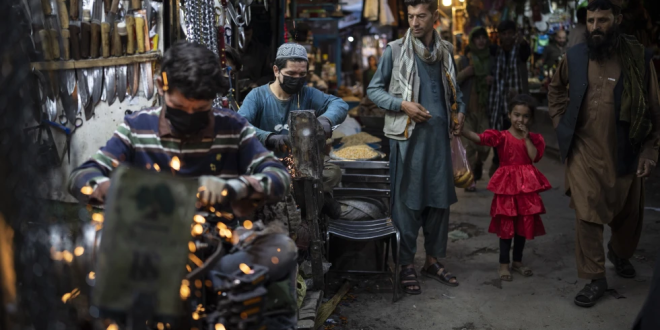KABUL – Afghanistan’s economy has shown signs of modest recovery, according to a recent World Bank report, which highlighted a slight GDP growth of 2.7% driven primarily by private consumption. After two years of severe contraction, this recovery, alongside a decline in food prices, has started to improve household welfare, though challenges remain.
Before the Taliban’s return to power in August 2021, Afghanistan’s economy was heavily dependent on foreign aid, and corruption was widespread. The Taliban’s takeover sent the economy into a sharp decline, freezing billions in international funds and triggering an exodus of skilled workers, many of whom took their expertise and resources with them.
While Afghanistan’s exports remained stable in 2023-24, the country faced a widening trade deficit due to a surge in imports, including essential goods such as fuel, food, and machinery. The World Bank cautioned that this imbalance could pose significant risks to the country’s long-term economic stability.
Faris Hadad-Zervos, the World Bank’s country director for Afghanistan, emphasized the need to unlock the potential of Afghanistan’s domestic private sector for sustained growth. He stressed the importance of increasing investment, improving access to finance for small businesses, and supporting female entrepreneurs to foster a more inclusive economic environment. “Without these measures, the country risks prolonged stagnation with limited prospects for sustainable development,” Hadad-Zervos warned.
The update arrives amid reports that the Taliban have imposed new restrictions on women’s education, including a ban on medical training for female students. While the Taliban has neither confirmed nor denied the reports, the United Nations Children’s Fund (UNICEF) expressed deep concern over the potential consequences. If true, the ban could severely limit women’s access to education and healthcare, with lasting effects on the Afghan population’s health and well-being.
UNICEF’s Executive Director, Catherine Russell, stressed that such a ban would not only hinder women’s economic opportunities but could also result in loss of life, further endangering the country’s already fragile health system.
The report underscores that while Afghanistan’s economic recovery may show initial signs of growth, a sustainable future depends on crucial investments and reforms, particularly in fostering gender equality and improving the business climate.
 Afghanistan Times
Afghanistan Times




